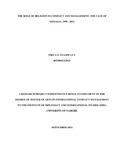| dc.description.abstract | Somalia is a country that has experienced conflict for more than two decades. It has had state
fragility, proliferation of small arms, conflict between clans and recently conflict by Islamist
movements. Religion has been used in the conflict in Somalia not only t manage violence but
also to escalate it. The emergence of Islamist movements also had led to further inclusion of the
country in the global jihadist list. Moreover, despite various efforts to manage the conflict, not
much has been done with relation to eliminating the groups. In fact conventional, military efforts
have been seen to contribute further in the conflict. This has also seen the inclusion of foreign
Islamist participating in the Somali conflict; and a as result counter-terrorist measures further
complicated the issue. The use of religion in the Somali conflict has further shown how
radicalization can further escalate a conflict. This thesis therefore was able to explain this factor
further. The study concludes that religion is not necessarily the cause of conflict in Somalia,
currently. But rather it has been used as an instrument of conflict and as such it can also be used
for the management of the same conflict in order to attain sustainable peace. | en_US |

